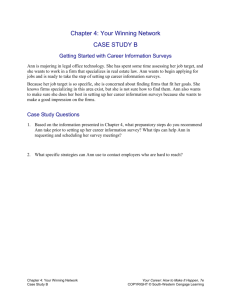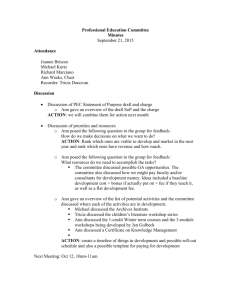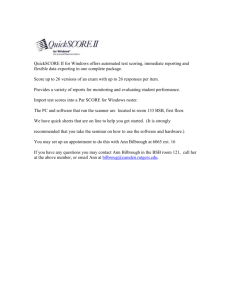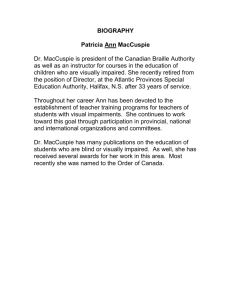Observation #3 Laura Nixon Mission Hill School Completed by M. Wilkerson-Jerde
advertisement
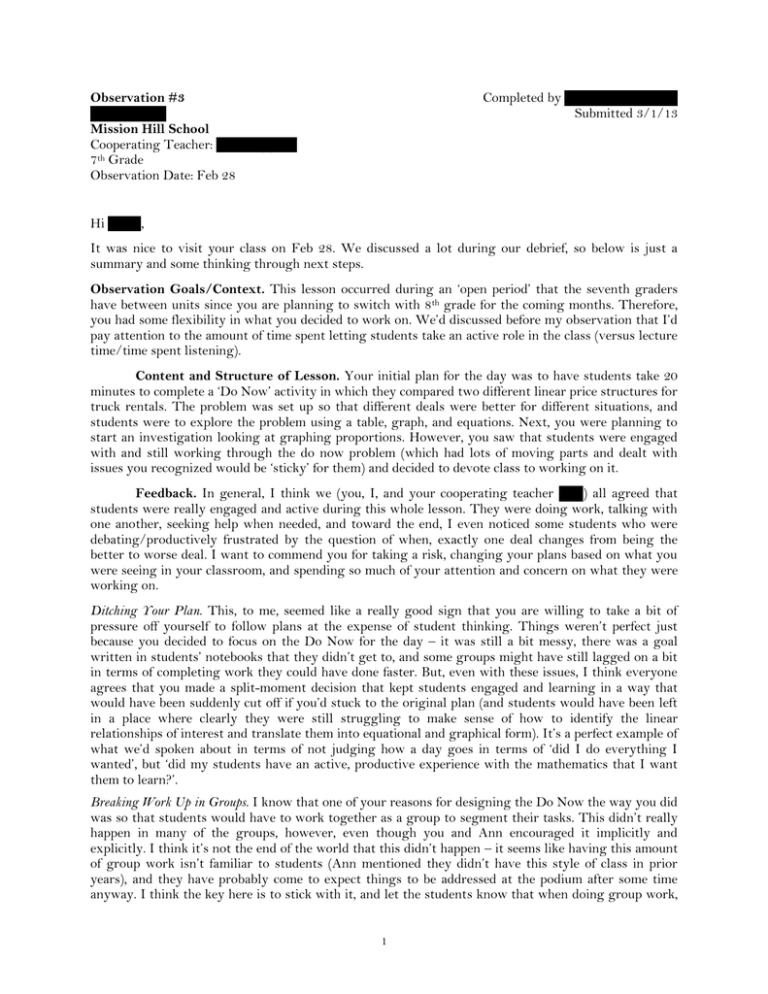
Observation #3 Laura Nixon Mission Hill School Cooperating Teacher: Ann Ruggiero 7th Grade Observation Date: Feb 28 Completed by M. Wilkerson-Jerde Submitted 3/1/13 Hi Laura, It was nice to visit your class on Feb 28. We discussed a lot during our debrief, so below is just a summary and some thinking through next steps. Observation Goals/Context. This lesson occurred during an ‘open period’ that the seventh graders have between units since you are planning to switch with 8th grade for the coming months. Therefore, you had some flexibility in what you decided to work on. We’d discussed before my observation that I’d pay attention to the amount of time spent letting students take an active role in the class (versus lecture time/time spent listening). Content and Structure of Lesson. Your initial plan for the day was to have students take 20 minutes to complete a ‘Do Now’ activity in which they compared two different linear price structures for truck rentals. The problem was set up so that different deals were better for different situations, and students were to explore the problem using a table, graph, and equations. Next, you were planning to start an investigation looking at graphing proportions. However, you saw that students were engaged with and still working through the do now problem (which had lots of moving parts and dealt with issues you recognized would be ‘sticky’ for them) and decided to devote class to working on it. Feedback. In general, I think we (you, I, and your cooperating teacher Ann) all agreed that students were really engaged and active during this whole lesson. They were doing work, talking with one another, seeking help when needed, and toward the end, I even noticed some students who were debating/productively frustrated by the question of when, exactly one deal changes from being the better to worse deal. I want to commend you for taking a risk, changing your plans based on what you were seeing in your classroom, and spending so much of your attention and concern on what they were working on. Ditching Your Plan. This, to me, seemed like a really good sign that you are willing to take a bit of pressure off yourself to follow plans at the expense of student thinking. Things weren’t perfect just because you decided to focus on the Do Now for the day – it was still a bit messy, there was a goal written in students’ notebooks that they didn’t get to, and some groups might have still lagged on a bit in terms of completing work they could have done faster. But, even with these issues, I think everyone agrees that you made a split-moment decision that kept students engaged and learning in a way that would have been suddenly cut off if you’d stuck to the original plan (and students would have been left in a place where clearly they were still struggling to make sense of how to identify the linear relationships of interest and translate them into equational and graphical form). It’s a perfect example of what we’d spoken about in terms of not judging how a day goes in terms of ‘did I do everything I wanted’, but ‘did my students have an active, productive experience with the mathematics that I want them to learn?’. Breaking Work Up in Groups. I know that one of your reasons for designing the Do Now the way you did was so that students would have to work together as a group to segment their tasks. This didn’t really happen in many of the groups, however, even though you and Ann encouraged it implicitly and explicitly. I think it’s not the end of the world that this didn’t happen – it seems like having this amount of group work isn’t familiar to students (Ann mentioned they didn’t have this style of class in prior years), and they have probably come to expect things to be addressed at the podium after some time anyway. I think the key here is to stick with it, and let the students know that when doing group work, 1 there’s an expectation that they’ll get it done themselves, they might not always have a clean ‘wrap up’ by you that does all the work anyway, and that they’ll need to find ways to do the work in a reasonable amount of time by collaborating with one another. You can’t expect those kinds of changes to happen over night, so keep at it. Moving Forward. My suggestions for moving forward are sort of at a ‘meta level’. We’ve talked about a lot of these things together. Taking Notes, Finding Ways to Train/Refocus Your Attention. We’d discussed that one way to ‘force’ your attention back to students, even at times when you might seek the comfort of the podium, might be to take short one or two word notes on what your students are thinking, doing, struggling with, doing really well with. You tried it during this lesson and it seemed to really help you start probing what it was your students were doing on a conceptual level. As I say in other observation reports, one thing I really try to pay attention to and take notes on is what the students in a class are saying and doing as evidence that they’re engaging with the ideas of the lesson. During this lesson, I got so much from their conversations – there were groups arguing about whether to use multiplication or addition to calculate the linear relationships in the Do Now activity (because they’re increasing by the same amount each mile, but the number of miles you need to calculate by increase by more than one), they were asking you about which value to put on which axis and why, and they were doing really great things (such as, for the second truck deal, adding $200) that they still needed to work on articulating and had a chance to work on over the course of the class. One thing we discussed after class was that another level that might make sense to take notes about is the state of the classroom as a whole, to train your attention on the general mood, where the class as a whole is, and attend to peripheral disruptions even as you engage more seriously with one student or a group. Taking Pressure Off of Yourself. A big message during the debrief coming from both Ann and I is for you to take some pressure off of yourself. Certainly it’s important to plan and hold yourself to high standards, but sometimes it seems like you are so focused on making sure that things are going perfectly that the students and their work takes a back seat to you thinking about your own teaching, if that makes sense. I tried to think of an example of this and thought about how you were wondering what today would mean for your plans tomorrow, and Ann suggested that you collect the students’ work and use that as a guide for what to focus on. A nice message from that is just – while it’s good to have an idea in mind of what you’ll be doing several days down the road, it’s more important to be reactive to what happens day-to-day in the classroom and respond. So part of the message about taking pressure off of yourself is not to overplan too much – then if something happens and you’re not where you want to be, you might blame yourself and feel like things aren’t going well. But if you’re not where you want to be because of things like today – your students really engaged in a way that was productive for them – that seems way more important than having executed something well that students were completely checked out of. I really enjoyed watching you teach, and look forward to learning more about you, your coop, your school and your students! 2
